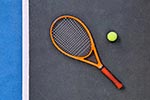Platform tennis is a relatively new sport with elements taken from tennis, squash and racquetball. It is played on a smaller court on a raised and heated platform that melts away snow and keeps players warm. Although it’s a popular sport in colder areas, it can be played year-round.
Despite its generally slower and more casual pace, platform tennis players’ fast and agile movements can also be prone to musculoskeletal injuries. If you’d like to try this game with others, you must be prepared. Like other sports, there are ways to minimize the risks of joint injuries, muscle strains and other injuries.
What Are the Common Platform Tennis Injuries?
Platform tennis players can develop various injuries and conditions if playing unprepared. These can include:
- Tennis Elbow: A common injury among tennis players that occurs when a player’s muscles and tendons are strained from the repetitive elbow movements of swinging the paddle. The area between your wrist and elbow could be painful and swollen.
- Ankle Sprain: The repetitive side-to-side movements and changes in direction can stretch or tear the ankle ligaments. Proper footwear and regular leg muscle strengthening exercises can minimize the risks of platform tennis players developing ankle sprains.
- Rotator Cuff Injury: The repetitive lifting of the arms overhead can lead to muscle damage around the shoulder joint. Proper form (i.e., using the whole body during swings instead of putting all the stress on the shoulder) can reduce the risk of injury.
- Knee Injuries: Players put added stress on their joints with sudden stops, jumps and changes in direction. This can lead to wear in the knees, leading to issues such as patellar tendonitis, meniscus tears and other knee injuries.
- Lower Back Pain: Platform tennis players can develop chronic lower back pain caused by poor posture, weak core muscles and repetitive twisting movements. Proper form, swinging technique and stronger core muscles can minimize these risks.
Tips for Preventing Platform Tennis Injuries
Like many team sports, there’s always some risk of developing platform tennis injuries. These tips can minimize the risk and ensure a safe and enjoyable game.
-
Warm-up and Stretch Before a Game
Although platform tennis is less intensive than regular tennis, starting a match without warming up is never a good idea. This could lead to muscle strains, joint injuries and feeling tired quickly. Before a game, warm up with some light jogging, leg and arm swings and abdomen twists. Use warm-ups and stretches focusing on the calves, hamstrings, quads, core and upper body, as these muscles are often used during a game.
-
Focus on Muscle Strengthening Exercises
Outside of platform tennis, you should have a regular fitness routine with strength training for the core, shoulders, arms and legs. The muscles in these areas could wear out or tear from repetitive movement, so strengthening them ahead of time can protect you from muscle injuries on the court.
Lifting weights and bodyweight exercises are good options for strength. At the same time, plyometrics and functional training can also help you with your footwork and agility to improve your performance and endurance in a match.
-
Choose Your Gear and Attire Carefully
Consider investing in a quality platform tennis paddle. Plenty of models range in length, grip size and length and ergonomic features that prevent musculoskeletal injuries. Plenty of platform tennis clubs allow you to rent paddles, so you can try different grip sizes to see which one gives the best comfort.
What you wear can also affect your mobility. Any athletic attire that offers maximum comfort and movement is suitable for the court. You should also invest in quality tennis shoes with good cushioning to soften the impact of stress on your ankles and knees.
-
Train Before You Start a Game
Some common platform tennis injuries result from poor form and technique, as these can add unnecessary pressure on your joints and muscles. If you’re a beginner, it’s best to train with a professional tennis instructor, as they can best guide you through the proper techniques.
Getting professional guidance can reduce the risk of injury, improve your performance in a match and ensure you’re not overexerting yourself in every game.
-
Cooldown After a Match
Even after a game ends, your body is at risk of musculoskeletal injuries if you don’t take the right cooldown steps. Think of the cooldown as transitioning from an active game to putting your body at rest. Start with simple stretches, focusing on active muscle areas during your game. Avoid immediately sitting down or putting your body at rest, as this can cause delayed onset muscle soreness later on. Keep your body hydrated, as replenishing lost fluids can help with muscle and joint recovery.
What Should I Do If I Feel Pain After a Game?
If you think you’ve developed an injury, you should schedule an appointment with an orthopedic specialist to seek tennis injury treatment as soon as possible. Most common sports injuries can be treated at home using rest, ice, compression and elevation (RICE):
- Rest: Avoid strenuous activities and other activities that strain the injured area.
- Ice: Apply wrapped ice packs to the injured area for up to 20 minutes to minimize swelling and pain.
- Compression: To minimize swelling, your healthcare provider may wrap the injured area in splints, wraps, or casts.
- Elevation: Swelling and pain can be minimized in some areas if elevated above heart level.
Additional self-care practices such as massages and rest days can minimize the risk of pain and discomfort after playing platform tennis.
Manage Your Sports Injuries With Benjamin Domb, M.D.
While platform tennis is less intensive than regular tennis, there are still plenty of risks associated with improper techniques and a lack of preparation. By following these tips, you can significantly reduce the risk of injuries on the tennis court.
If you are currently experiencing chronic pain or are worried about sports-related injuries, Dr. Benjamin Domb can assist you with managing your condition. Get back in the game safely when you can safely manage and recover with specialized care. Call us today at (833) 872-4477 or book online to request an appointment.

